-
 Bitcoin
Bitcoin $114400
1.32% -
 Ethereum
Ethereum $3499
2.20% -
 XRP
XRP $2.922
4.26% -
 Tether USDt
Tether USDt $0.0000
0.03% -
 BNB
BNB $752.6
1.53% -
 Solana
Solana $161.8
1.64% -
 USDC
USDC $0.9999
0.01% -
 TRON
TRON $0.3267
1.32% -
 Dogecoin
Dogecoin $0.1991
3.02% -
 Cardano
Cardano $0.7251
3.29% -
 Hyperliquid
Hyperliquid $38.32
3.36% -
 Stellar
Stellar $0.3972
7.58% -
 Sui
Sui $3.437
2.74% -
 Chainlink
Chainlink $16.29
3.65% -
 Bitcoin Cash
Bitcoin Cash $545.3
3.70% -
 Hedera
Hedera $0.2482
7.49% -
 Ethena USDe
Ethena USDe $1.001
0.03% -
 Avalanche
Avalanche $21.40
2.02% -
 Toncoin
Toncoin $3.579
1.56% -
 Litecoin
Litecoin $109.3
2.20% -
 UNUS SED LEO
UNUS SED LEO $8.951
-0.18% -
 Shiba Inu
Shiba Inu $0.00001220
2.75% -
 Polkadot
Polkadot $3.613
2.99% -
 Uniswap
Uniswap $9.173
3.78% -
 Monero
Monero $302.6
2.62% -
 Dai
Dai $0.0000
0.00% -
 Bitget Token
Bitget Token $4.320
1.52% -
 Pepe
Pepe $0.00001048
3.40% -
 Cronos
Cronos $0.1314
4.33% -
 Aave
Aave $259.4
3.54%
How do NFT secondary market trading platforms promote global transactions?
NFT platforms promote global transactions through global accessibility, decentralized nature, cross-border payments, marketplace liquidity, and community features.
Apr 15, 2025 at 11:42 pm
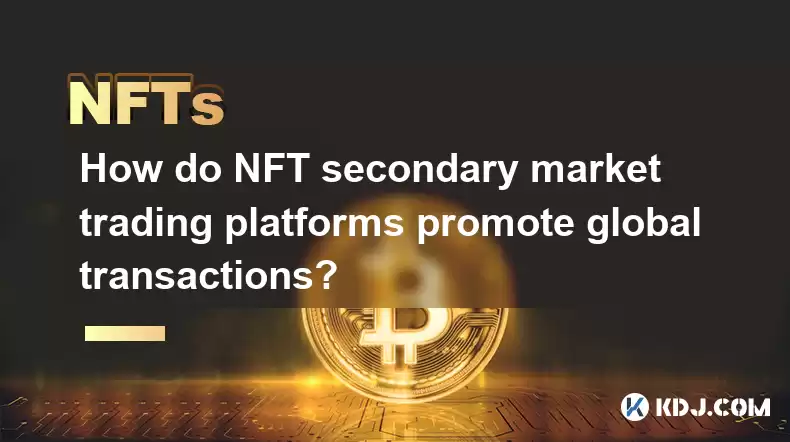
NFT secondary market trading platforms have revolutionized the way digital assets are bought and sold, enabling seamless global transactions. These platforms facilitate the trading of non-fungible tokens (NFTs), which are unique digital assets that can represent art, music, virtual real estate, and more. By leveraging blockchain technology, these platforms ensure secure, transparent, and efficient transactions across borders. In this article, we will explore how NFT secondary market trading platforms promote global transactions, focusing on their key features and functionalities.
Global Accessibility
One of the primary ways NFT secondary market trading platforms promote global transactions is through their global accessibility. These platforms are designed to be accessible to users from any part of the world, provided they have an internet connection. This means that buyers and sellers from different countries can easily interact and trade NFTs without the need for physical presence or intermediaries.
To access these platforms, users typically need to create an account, which often involves connecting a cryptocurrency wallet. This wallet serves as a digital identity and a means to store and manage NFTs. The process of setting up an account is straightforward:
- Visit the platform's website and click on the "Sign Up" or "Register" button.
- Enter your email address and create a strong password.
- Connect your cryptocurrency wallet, such as MetaMask or Trust Wallet, by following the platform's instructions.
- Verify your email address to complete the registration process.
Once registered, users can browse the marketplace, list their NFTs for sale, or purchase NFTs from other users. The global accessibility of these platforms ensures that a diverse range of NFTs is available to a worldwide audience, fostering a vibrant and inclusive marketplace.
Decentralized Nature
Another crucial aspect of NFT secondary market trading platforms is their decentralized nature. Unlike traditional marketplaces that rely on centralized servers and intermediaries, NFT platforms operate on blockchain networks, such as Ethereum or Binance Smart Chain. This decentralization eliminates the need for a central authority, reducing the risk of censorship, fraud, and downtime.
The decentralized nature of these platforms also means that transactions are recorded on the blockchain, providing a transparent and immutable ledger of all activities. This transparency builds trust among users, as they can verify the authenticity and ownership of NFTs without relying on third parties.
To participate in transactions on a decentralized platform, users need to have cryptocurrency in their wallets to cover transaction fees, known as gas fees. The process of buying an NFT typically involves the following steps:
- Browse the marketplace and select the NFT you wish to purchase.
- Click on the "Buy" or "Bid" button, depending on the listing type.
- Review the transaction details, including the price and any additional fees.
- Confirm the transaction using your connected wallet, which will prompt you to sign the transaction with your private key.
- Wait for the transaction to be processed and confirmed on the blockchain, which may take a few minutes depending on network congestion.
The decentralized nature of NFT platforms ensures that global transactions are secure and efficient, enabling users to trade with confidence.
Cross-Border Payments
NFT secondary market trading platforms facilitate cross-border payments by allowing users to transact using cryptocurrencies. Cryptocurrencies, such as Ethereum (ETH) or Binance Coin (BNB), serve as the native currency on many NFT platforms, enabling seamless and instant transactions across borders.
The use of cryptocurrencies eliminates the need for currency conversion and reduces the costs associated with traditional cross-border payments. Users can simply transfer the required amount of cryptocurrency to complete a transaction, regardless of their geographical location.
To make a payment on an NFT platform, users follow these steps:
- Ensure that their wallet has sufficient cryptocurrency to cover the purchase price and transaction fees.
- Initiate the transaction by clicking on the "Buy" or "Bid" button on the NFT listing.
- Enter the amount of cryptocurrency to be transferred and review the transaction details.
- Confirm the transaction using their wallet, which will deduct the required amount of cryptocurrency and send it to the seller's wallet.
- Wait for the transaction to be confirmed on the blockchain, after which the NFT will be transferred to the buyer's wallet.
The ability to make cross-border payments using cryptocurrencies is a significant advantage of NFT secondary market trading platforms, promoting global transactions and expanding the reach of the NFT ecosystem.
Marketplace Liquidity
NFT secondary market trading platforms promote global transactions by enhancing marketplace liquidity. Liquidity refers to the ease with which assets can be bought and sold without significantly affecting their price. High liquidity is essential for a thriving marketplace, as it attracts more buyers and sellers, leading to increased trading activity.
To enhance liquidity, NFT platforms often implement various features and incentives, such as:
- Low transaction fees: By keeping transaction fees low, platforms encourage more frequent trading, which in turn increases liquidity.
- Auction mechanisms: Platforms may offer different auction formats, such as English auctions, Dutch auctions, or sealed-bid auctions, to attract a diverse range of buyers and sellers.
- Marketplace incentives: Some platforms offer rewards or incentives for users who list their NFTs for sale or participate in trading activities, further boosting liquidity.
The increased liquidity on NFT secondary market trading platforms attracts a global audience, as users from different regions can easily find buyers or sellers for their NFTs. This global participation contributes to a more dynamic and active marketplace, promoting global transactions.
Community and Social Features
Finally, NFT secondary market trading platforms promote global transactions through their community and social features. These platforms often include features that foster a sense of community and encourage user engagement, such as forums, chat rooms, and social media integration.
By connecting users from around the world, these community features facilitate networking and collaboration, leading to increased trading activity. Users can share their experiences, discuss trends, and showcase their NFT collections, creating a vibrant and interactive environment.
Some platforms also offer features that allow users to follow other users, like or comment on NFTs, and participate in community events or challenges. These social interactions not only enhance the user experience but also attract more users to the platform, further promoting global transactions.
To engage with the community on an NFT platform, users can:
- Join forums or chat rooms to discuss NFTs and share insights.
- Follow other users to stay updated on their activities and NFT collections.
- Participate in community events or challenges to win rewards or gain recognition.
- Share their own NFTs and engage with other users through likes, comments, and direct messages.
The community and social features of NFT secondary market trading platforms play a crucial role in promoting global transactions by fostering a sense of belonging and encouraging user participation.
Frequently Asked Questions
Q: How do NFT platforms ensure the security of global transactions?
A: NFT platforms ensure the security of global transactions through the use of blockchain technology. Transactions are recorded on the blockchain, providing a transparent and immutable ledger that cannot be altered or tampered with. Additionally, users must sign transactions with their private keys, adding an extra layer of security. Many platforms also implement additional security measures, such as two-factor authentication and encryption, to protect user accounts and data.
Q: Can users from countries with strict cryptocurrency regulations participate in NFT trading?
A: The ability of users from countries with strict cryptocurrency regulations to participate in NFT trading depends on the specific regulations in place. Some platforms may restrict access to users from certain countries, while others may allow participation but require users to comply with local regulations. It is important for users to research and understand the legal implications of NFT trading in their country before participating.
Q: How do NFT platforms handle disputes between buyers and sellers in global transactions?
A: NFT platforms typically have dispute resolution mechanisms in place to handle conflicts between buyers and sellers. These mechanisms may include mediation services, arbitration, or escrow services that hold funds until both parties are satisfied with the transaction. The specific dispute resolution process can vary between platforms, so it is important for users to familiarize themselves with the platform's policies before engaging in transactions.
Q: Are there any fees associated with global transactions on NFT platforms?
A: Yes, there are typically fees associated with global transactions on NFT platforms. These fees can include transaction fees, known as gas fees, which are paid to the blockchain network to process transactions. Additionally, platforms may charge listing fees, buyer fees, or seller fees, which vary depending on the platform and the type of transaction. Users should review the fee structure of the platform they are using to understand the costs involved in global transactions.
Disclaimer:info@kdj.com
The information provided is not trading advice. kdj.com does not assume any responsibility for any investments made based on the information provided in this article. Cryptocurrencies are highly volatile and it is highly recommended that you invest with caution after thorough research!
If you believe that the content used on this website infringes your copyright, please contact us immediately (info@kdj.com) and we will delete it promptly.
- Kaspa, HBAR, and Cold Wallet: A New York Minute on Crypto's Latest Moves
- 2025-08-04 09:11:54
- Ethereum Whale Watch: Selling Pressure and Price Volatility
- 2025-08-04 09:11:54
- XRP ETF Mania: Teucrium's Crypto Triumph and the Altcoin Frenzy
- 2025-08-04 09:30:13
- Crypto Wallet Scam: A $900K Loss & What You Need to Know
- 2025-08-04 09:35:13
- Dogecoin's Wild Ride: Elliott Wave, Stochastic RSI, and What's Next, Ya Know?
- 2025-08-04 09:40:12
- Shiba Inu (SHIB), Crypto Investments, and the Meme Coin Evolution: What's the Deal?
- 2025-08-04 09:45:17
Related knowledge
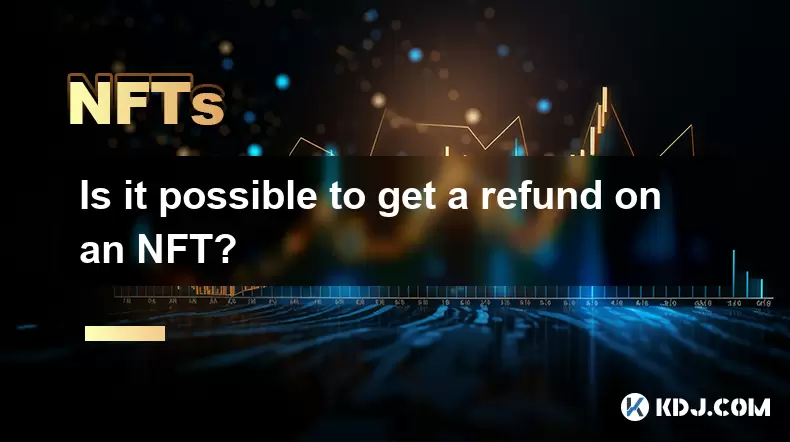
Is it possible to get a refund on an NFT?
Jul 21,2025 at 08:35pm
Understanding NFT Transactions and RefundsWhen you purchase an NFT (Non-Fungible Token), the transaction is typically recorded on a blockchain, making...
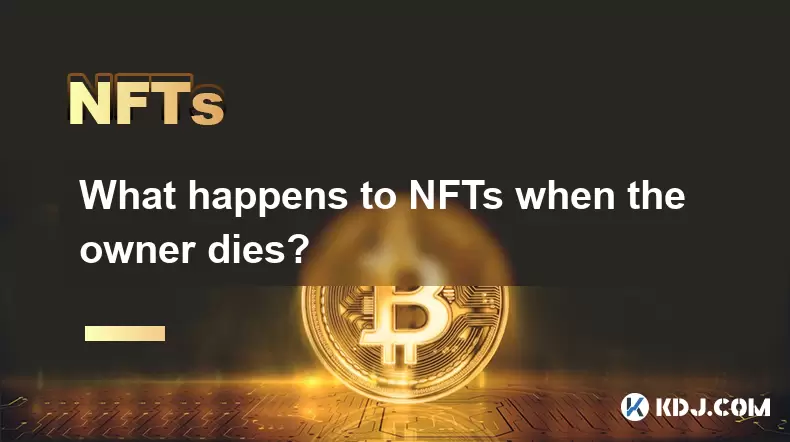
What happens to NFTs when the owner dies?
Jul 22,2025 at 02:43pm
Legal Ownership and Digital AssetsWhen an individual owns NFTs, the question of what happens to these assets upon their death is a pressing one. NFTs ...
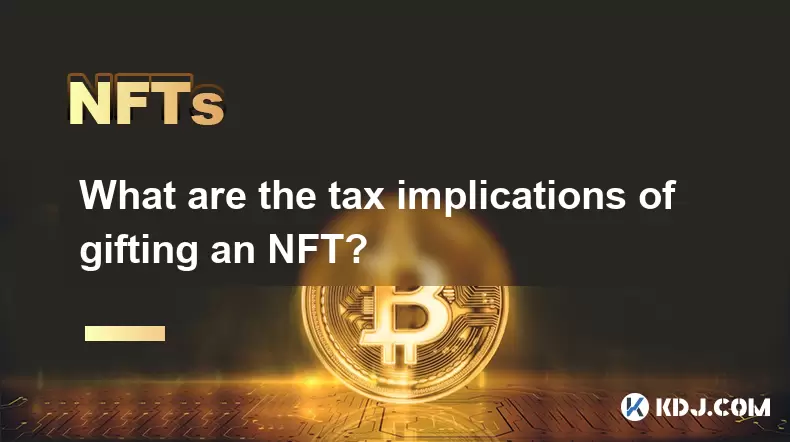
What are the tax implications of gifting an NFT?
Jul 19,2025 at 04:21am
Understanding the Basics of NFT GiftingGifting a Non-Fungible Token (NFT) involves transferring ownership from one individual to another without recei...
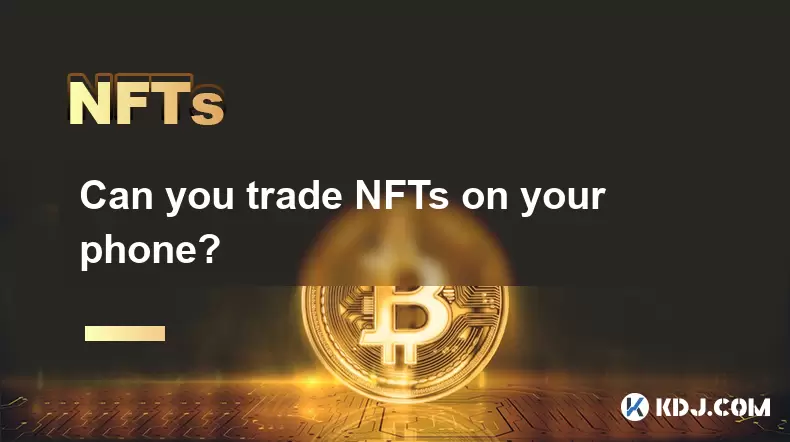
Can you trade NFTs on your phone?
Jul 18,2025 at 04:29am
Trading NFTs on Mobile DevicesYes, you can trade NFTs on your phone, and the process has become increasingly streamlined thanks to a variety of mobile...
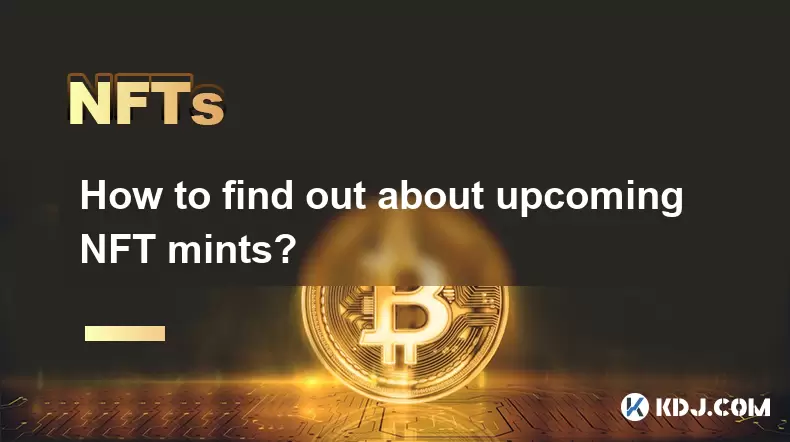
How to find out about upcoming NFT mints?
Jul 18,2025 at 11:50am
Exploring NFT Minting OpportunitiesUnderstanding the landscape of upcoming NFT mints is crucial for collectors, investors, and creators who wish to st...
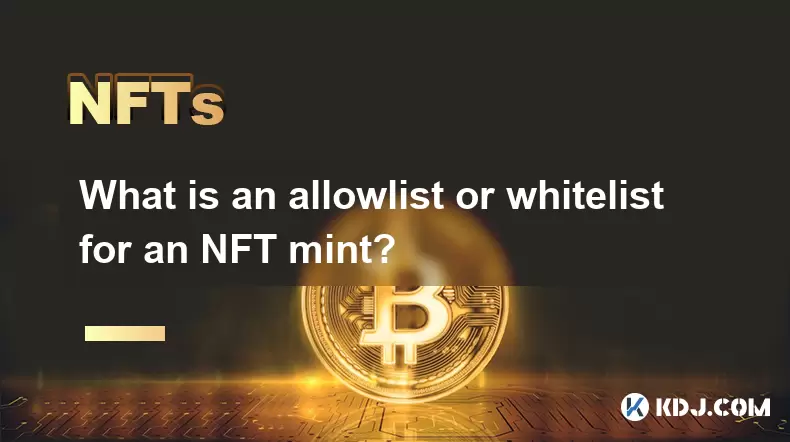
What is an allowlist or whitelist for an NFT mint?
Jul 20,2025 at 07:14pm
Understanding the Concept of an Allowlist for NFT MintingAn allowlist, also commonly referred to as a whitelist, is a mechanism used in the NFT mintin...

Is it possible to get a refund on an NFT?
Jul 21,2025 at 08:35pm
Understanding NFT Transactions and RefundsWhen you purchase an NFT (Non-Fungible Token), the transaction is typically recorded on a blockchain, making...

What happens to NFTs when the owner dies?
Jul 22,2025 at 02:43pm
Legal Ownership and Digital AssetsWhen an individual owns NFTs, the question of what happens to these assets upon their death is a pressing one. NFTs ...

What are the tax implications of gifting an NFT?
Jul 19,2025 at 04:21am
Understanding the Basics of NFT GiftingGifting a Non-Fungible Token (NFT) involves transferring ownership from one individual to another without recei...

Can you trade NFTs on your phone?
Jul 18,2025 at 04:29am
Trading NFTs on Mobile DevicesYes, you can trade NFTs on your phone, and the process has become increasingly streamlined thanks to a variety of mobile...

How to find out about upcoming NFT mints?
Jul 18,2025 at 11:50am
Exploring NFT Minting OpportunitiesUnderstanding the landscape of upcoming NFT mints is crucial for collectors, investors, and creators who wish to st...

What is an allowlist or whitelist for an NFT mint?
Jul 20,2025 at 07:14pm
Understanding the Concept of an Allowlist for NFT MintingAn allowlist, also commonly referred to as a whitelist, is a mechanism used in the NFT mintin...
See all articles

























































































